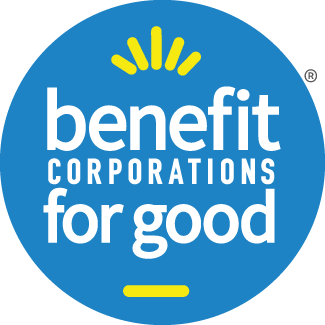Difference between a Certified Benefit Corporation for Good & a Certified B Corp
What are the key differences between a certified Benefit Corporation for Good and a certified B Corp? Doing good in your community is just the beginning.
Does your business do good in your community? Two options for certifying your commitment to the environment and society — becoming a benefit corporation through Benefit Corporations for Good, and becoming a B Corp through B Lab — almost sound like the same thing. However, the requirements and upsides are different. Whether you should seek certification through BCFG, B Lab, both, or neither depends on your business.
Process
A benefit corporation is a type of legal structure that requires businesses to consider the public benefit while making business decisions. (The structure is called “benefit company” in Oregon.) Benefit corporations are also required to release an annual report on public benefit based on a third party standard like BCFG. Certification is a straightforward process involving a 1-2 hour 60-question questionnaire and meeting with a BCFG senior principal to make sure the business aligns with the philosophy of a benefit corporation. A B Corp is certified by B Lab, a nonprofit. B Lab requires businesses to “demonstrate high social and environmental performance” through its assessment. B Lab also has a legal requirement — one way to fulfill this is by becoming a benefit corporation — and a transparency requirement to publicize assessment results. New businesses or smaller businesses often choose to become a benefit corporation before going through the longer process of B Corp certification.
Community
Either certification is a good way to become connected to other businesses with similar values. B Lab has a larger number of certified businesses — over 2,000 in the U.S. & Canada. It also provides a directory to make it easy to find B Corps and to facilitate collaboration between B Corps. Local chapters help promote B Corps on social media, host events, and hold conferences.
Benefit Corporations for Good has a diverse community across 9 states and British Columbia. Industries with BCFGs include law, marketing, retail, media, SEO, clean energy, and many others. Thanks to this diversity, while being part of a tight-knit community, BCFGs often find opportunities to collaborate with each other. BCFG also places an emphasis on promotion of certified benefit corporations via social media, newsletters and blogs, and the BCFG website. Certified business leaders can (1) attend members only quarterly Happy Hours for Good to learn and meet other BCFG members, (2) receive special offers from other BCFGs, and (3) participate in workshops designed specifically for purpose-driven leaders. BCFG does advocacy work as well, including leading the push for an Oregon bill, that is now law, to give benefit corporations an advantage when competing for state contracts.
Cost
BCFG and B Lab both have a range of prices depending on the size of the company. B Lab certification fees vary based on a business’s gross annual revenue. For businesses making under $500,000 a year, B Lab charges a one-time $150 submission fee and an annual $2,000 fee. BCFG certification fees vary based on a business’s number of employees. For businesses with less than 5 employees, BCFG charges a one-time $299 fee and an annual $199 fee for recertification. The one-time fee is capped at $899 for businesses with over 51 employees.
Receiving one or both of these certifications gives credibility to the good that your business is doing. Businesses can point to their certification by a third party to customers, partners, and potential employees who value people and planet.
Contact us with any questions about becoming a certified benefit corporation for good or set up a meeting with us free-of-charge.
~benefitcorporationsforgood.com~

